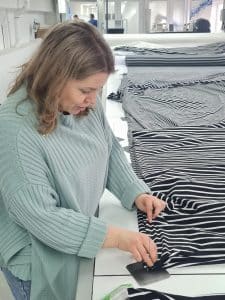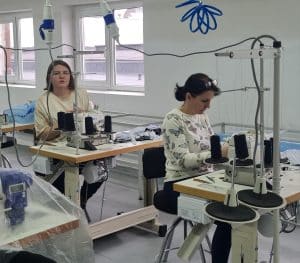The formation of the First Kyiv Sewing Cooperative emerged as a collaborative effort, tackling challenges and exploring new perspectives. Two women – Olena Tovstokora and Tetiana Priadko, who had garment industry experience, joined forces with Dariia Konovalova who had planned to start her own business. The women decided to pool their resources and expertise to establish a unified brand focused on producing high-quality sewing products demanded by the market.
“The SEW Ukraine project has empowered us to enhance our production capacity and capabilities, paving the way for significant advancements in this direction,” Olena, who is the head of the co-operative, said.
Specializing in knitwear production, as well as home sports suits and pajamas which includes men’s, women’s, and children’s basic underwear, the SEW Ukraine project provided the co-operative with equipment specializing in processing knit fabrics, automated cutting, and printing. Some equipment was purchased at co-operative members’ own expense by pooling resources together, which included basic sewing machines.
During the initial stages of operations, co-operative members came together to resolve challenges with the support of the SEW Ukraine project by taking training workshops together.

A member of the First Kyiv Sewing Cooperative works on fabric.
Olena said the co-operative faced complexities, such as expanded membership, which challenges the co-op because it requires members to share ideas, collaborate and align diverse interests while navigating this new form of cooperation within the light industry.
“Each member brings unique contributions, such as equipment or expertise, which must be harmonized to ensure seamless collaboration,” Olena said.
Anton Lisyutin, the co-operative executive director, who has experience in managing garment enterprises and launching new production capacities, said unlike agricultural or residential co-operatives where there are simple processing facilities or needs to manage common territory, garment co-operatives entail coordinating various equipment and positions, each tailored to specific fabric types and processing needs. This necessitates meticulous coordination and adaptation.
“For example, for sewing knitwear, you need a needle for knitwear, which must have a certain sharpening angle. When transitioning from light to medium or heavy fabrics, equipment needs to be readjusted as well,” Anton said.
The First Kyiv Sewing Cooperative found a solution – the co-op is creating a joint product with members contributing resources and expertise to the product, Olena said.
“Our expansion strategy will involve finding co-operators who have experience and are ready to contribute in some way: their own experience, equipment, potential in sales. If we involve people from other directions, there will be difficulties,” added Olena.
Some co-operative members have joined without prior experience, mostly after completing tailoring courses as part of the SEW Ukraine project. The co-op provides employment opportunities and professional development for course graduates who are particularly motivated to work there.
The co-op is helping members learn new job skills and improving their tailoring qualifications, which is helping them stand out in the labour market, a co-op member added.
“There is currently a shortage of workers in the labour market due to migration and internal displacement. It is necessary to retrain employees or train them almost from scratch,” commented Tetiana.
There are also economic benefits as the co-operative’s profitability is creating new jobs, which is improving the financial lives of co-op members. In addition to employment opportunities, there are also social benefits when joining a co-operative because it allows women to provide each other with mutual assistance and a community has developed because members socialize with each other after work, one member said.

Co-op members sew materials.
Tetiana has extensive experience in the garment industry as a technologist. Her teaching talent has contributed to the emergence of skilled tailors throughout Ukraine, and co-operatives benefit from her experience to train personnel and increase productivity.
Anton said the co-operative is in the initial stage of development where all the processes are being launched. In addition, staff are being recruited and trained. He added the co-op has purchased materials and equipment.
“We lack both human and financial resources for promotion. Also, we’re working on business connections and establishing contacts with potential clients,” he said.
The SEW Ukraine project plays a pivotal role in supporting these endeavours, facilitating brand development, market entry, and promotional activities.
“A website template is developed for each cooperative with support of the SEW Ukraine project, so this will be a good incentive for developing our own website and managing social networks for sales in the Ukrainian market,” Olena said. Co-op members are also aiming to enter foreign markets as well. They are planning to benefit from the Canadian experience and opportunities provided by the project:
“We have set an ambitious goal of entering the Canadian market. With the help of the project, we are working on the environmental component of production, developing our own product concept for foreign markets – we want to promote a line of basic underwear,” Anton said.